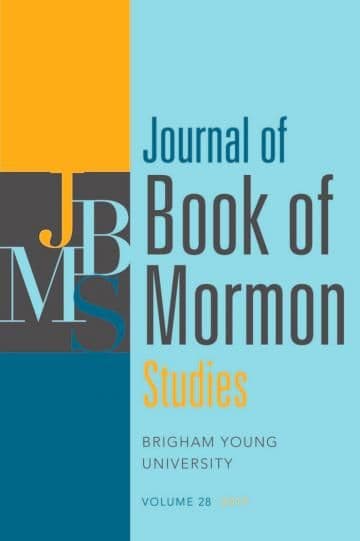Journal
Book of Mormon Answers: "Fulness of the gospel" and "familiar spirit"

Title
Book of Mormon Answers: "Fulness of the gospel" and "familiar spirit"
Publication Type
Journal Article
Year of Publication
1998
Authors
Tvedtnes, John A. (Primary)
Journal
Journal of Book of Mormon Studies
Number of Pages
74
Volume
7
Issue
1
Abstract
Responses to the following questions appear here: “Is the ‘fulness of the gospel’ in the Book of Mormon?” and “What is the meaning of ‘familiar spirit’ in Isaiah 29?”
Book of Mormon Answers: “Fulness of the gospel” and “familiar spirit”
Each issue of the Journal addresses one or more questions that students of the Book of Mormon have raised regarding the book. A number of people associated with FARMS have collaborated to prepare answers to these questions based on sound scholarly research. The extensive file that has resulted is the source for this feature. This material is presented to expand the education of all concerned with the Nephite scripture, not particularly as a “defense” of the book.
Question: The Book of Mormon is supposed to contain “the fulness of the gospel.” But it doesn’t discuss such LDS beliefs as premortal existence, eternal progression, plurality of gods, three degrees of glory, baptism for the dead, eternal marriage, or the Word of Wisdom. Why not? answer: Although Latter-day Saints frequently use the term gospel to refer to the whole body of truth to be learned through the restored church, this is not the real meaning of the term. The gospel is the “good news” of Christ’s atonement, and its first principles are faith, repentance, baptism, and receiving the Holy Ghost. This is the definition followed in the Book of Mormon as well as in the Doctrine and Covenants and other inspired sources, as in 1 Nephi 10:14; 15:13-14; 3 Nephi 27:13-21; Ether 4:18; D&C 3:20; 13:1; 20:9; 27:5 and so on. D8<C 93:51 uses the term the gospel of salvation, while Abraham 2:11 speaks of “the blessings of the Gospel, which are the blessings of salvation, even of life eternal.” In Jacob 7:6 the gospel is defined as “the doctrine of Christ,” referring to the doctrine concerning Christ’s death, atonement, and resurrection to provide the means by which we can be saved from death, sin, and hell. This reference was before the Savior lived on earth in the flesh, thus it did not refer to the totality of what he would teach. Elsewhere the Book of Mormon equates the “fulness of the gospel” with coming “to the knowledge of the true Messiah” (1 Nephi 10:14; 15:13-14; 3 Nephi 20:30-31). The Book of Mormon contains the most lucid explanation of the atonement of Christ and its consequences for humans (see especially 2 Nephi 2, 9; Mosiah 15; Alma 34, 42) and therefore qualifies as containing “the fulness of the gospel.”
Question: Mormons sometimes say that Isaiah 29:1-4 refers to the Book of Mormon, but this passage includes the phrase “familiar spirit,” which is used to designate witchcraft when it is used in the Old Testament.
Answer: A study by Robert Cloward that appears in the book Isaiah in the Book of Mormon (ed. Donald W. Parry and John W. Welch. Provo: FARMS, 1998), demonstrates that Isaiah’s prophecy in chapter 29 referred to the people at Jerusalem, not to Lehi’s descendants. However in 2 Nephi 27, Nephi continued his established practice of “likening” the words of Isaiah to his own people. In pointing out the relevance of Isaiah’s prophecy to his Nephites, he incorporates some of Isaiah’s words into his own prophecy of the coming forth of the Book of Mormon. The biblical expression “familiar spirit” often refers to a ghost, and the King James Version of the Bible takes great liberty in construing statements about “them that have familiar spirits” as referring to spirit mediums, even when that is not always intended in the Hebrew. The single Hebrew word involved comes through in the KJV in terms like these:
“them that have familiar spirits” (Leviticus 19:31; Isaiah 8:19; 19:3)
“those that have (or had) familiar spirits” (1 Samuel 28:3, 9)
“the workers with familiar spirits” (2 Kings 23:24)
“counsel of one that had a familiar spirit” (1 Chronicles 10:13)
“familiar spirits” (2 Kings 21:6).
However in the case of Isaiah 29:4 the Hebrew is best read as “thy voice shall be as a ghost out of the ground”; it has nothing to do with spirit mediums. The New English Bible version indeed translates it as “ghostlike out of the ground.” That fits well with Nephi’s intention and use of Isaiah’s statement in reference to the record of his own people who would become extinct.
Subject Keywords
Bibliographic Citation
Terms of use
Items in the BMC Archive are made publicly available for non-commercial, private use. Inclusion within the BMC Archive does not imply endorsement. Items do not represent the official views of The Church of Jesus Christ of Latter-day Saints or of Book of Mormon Central.